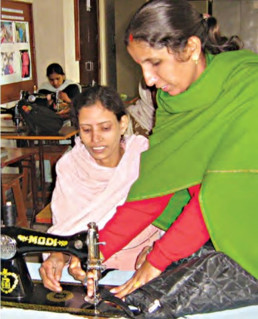
From an Abused Widow to Active Entrepreneur
The following anecdote illustrates, through an individual beneficiary’s story, how the CBOs and the four strategic principles enable CORD to transform the lives of the poor people, who then mutually help each another. Moreover, the story depicts how CORD enriches various aspects of a person as a whole even though the entry point may be through any one of its program components.
Binta Devi became a young widow when her husband, a truck driver, died of HIV/AIDS. Her husband had acquired the disease during his frequent travels to the metropolitan cities. However, her late husband’s family blamed Binta for his death. She and her two children were ostracized by her family. Beaten and kicked out of her original room in the house by her in-laws, shut in a very small dark room where water leaked from the roof, she was physically and verbally abused by her in-laws who, too, were extremely poor. Her children were forced to drop out of school. With no money and nowhere to go, she and her children became malnourished and emaciated. When the local women’s group, called the Mahila Mandal and the Self-Help Group within it (groups which were nurtured by CORD), heard about her condition, they became concerned and brought her to CORD’s clinic. When CORD workers saw her, she weighed only seventy-six pounds. Even her two children were malnourished and scrawny. The three of them looked terrified.
Binta and her two children were referred for HIV testing. Fortunately, all of their test results were negative. With the help of the Mahila Mandal (Women’s Club) in her village that had been promoted by CORD, the field workers from CORD helped Binta get some food from the government’s public distribution system, food to which she was entitled but had not been able to access earlier. The family was counseled by CORD’s informal legal cell team about women’s rights and by the women’s group about the mode of transmission of HIV/AIDS. After a few sessions with the family by the Mahila Mandal and the Panchayat leaders, Binta’s rightful place in the home was ensured by the pressure created by the Mahila Mandal in her village.
The Mahila Mandal in her village then interacted with the school. The school teachers in the small village, out of fear of HIV/AIDS, had forced Binta’s children out of the school. These misinformed teachers were not willing to learn and only acted when some of the members of the women’s groups threatened them by saying, “Give it to us in writing that you will not readmit the children. We will take your statement to the higher education authorities at the block and district levels. Then we will see how the children are not educated in the government school!” Binta’s children, who had been thrown out by the small village school run by the government, were taken back by the school with no further arguments! Subsequently, they all understood their mistake.
Furthermore, the women’s group ensured that Binta became entitled to the widow’s pension of Rs. 330 (about five-six dollars) per month from the government by getting the President of the Panchayat to endorse her application. Though a very small amount, the pension meant much to her. The group enrolled her as one of their members in the Women’s Group as well as in the Self-Help Group (SHG) for access to micro-credit. She learned to save small amounts and get loans from the Self-Help Group and, with that group’s help, from a regular bank without collateral.
Binta’s group motivated her to learn sewing skills. She joined CORD’s sewing training program, where she could earn as she learned. As she learned to stitch garments, she began to take small loans from her SHG to buy raw material to make stitched products. She began to earn a small amount every month. After two years, she began to get enough orders to earn a fair living from this micro-enterprise. She now trains other girls in stitching, charging them a small fee, which adds to her income. Presently, she is an important micro-entrepreneur and member of a Self-Help Group outlet called Guru Dhara Self-Help Group shop run by the women members themselves. Binta and her family now live a dignified, healthy life. Binta’s dream, she says with a broad smile, is to educate her children and build a small home for her family. She earns Rs. 3,000 to Rs. 5,000 per month; with the extra help from the government for food and with an increase in her widow’s pension to Rs. 600, she is now content and happy.